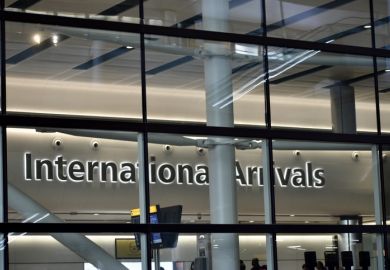The question of how a university leader should respond to divisive national and international political developments has become particularly pertinent in recent years.
But it is a dilemma that is perhaps especially challenging for University of Pennsylvania president Amy Gutmann – who is not only a political scientist, specialising in notions of compromise and deliberation in democracy, but also the leader of Donald Trump’s alma mater.
Professor Gutmann’s strategy, according to local news reports, has been to say as little as possible about the administration led by an economics graduate of Penn’s Wharton School. An article in Philadelphia magazine last year says that Professor Gutmann “put up a wall of silence, refusing to denounce Trump or his views” when he emerged as a serious presidential candidate, an approach that led to an online petition from an alumnus calling for her to condemn his rhetoric.
Another article published earlier this year in The Daily Pennsylvanian, the university’s student newspaper, claims: “To this day, Gutmann has not mentioned Donald Trump by name” – although a video embedded in the same article shows her referencing “President Trump’s recent executive order”.
“It’s not a fact that I have never mentioned the name because in that video I actually do,” Professor Gutmann told Times Higher Education.
However, she acknowledged that her general strategy was to “speak out on policies but not on people”, adding that she has publicly spoken out in favour of allowing immigrants brought into the US illegally as children to stay in the country and against executive orders on immigration.
“What I speak out firmly about are things that are consistent with the values of our university. And being open to the best and brightest from all over the world is one of our values,” she said.
“That’s both an ethical and a pragmatic strategy. It fits our values that we are allowed to be a non-profit institution on the basis that we are non-partisan, but…I feel a responsibility to speak out [about] and work hard [on] those policies that are critical to our mission.”
While many US universities have been hit with a decline in applications from international students in the wake of Mr Trump’s election, Penn has seen an increase, which Professor Gutmann attributes in part to her public statements.
Professor Gutmann’s latest book, The Spirit of Compromise: Why Governing Demands It and Campaigning Undermines It, co-authored by Harvard University professor Dennis Thompson and published in 2012, makes the case that in a democracy political leaders must compromise to prevent “political paralysis”, as demonstrated by the “gridlock” in Congress in recent years.
Professor Gutmann said that “whenever any institution comes forward and asks for something from government which is, let’s say monetary, there’s likely to be some compromise necessary” but added that it did not mean universities should be “complacent”.
“I like to say that complacency is the smother of invention,” she said. “Yes, we have to make compromises with people that we’re asking things from. But should we then be satisfied when we get less than what’s ideal? No, you keep trying to do more, to show that you’re going to do more.”
Professor Gutmann refused to be drawn on what the results of the recent US midterm elections will mean for higher education policy but welcomed the increased voter turnout among students at her university – a trend that she said reflected her own values but also “Penn’s values” as an institution strongly committed to civic engagement.
According to The Daily Pennsylvanian, in excess of 3,300 students voted at Penn’s eight on-campus polling stations last month, more than tripling the number of those who voted in the 2014 midterms, based on numbers collected by the institution’s Office of Government and Community Affairs. Professor Gutmann credited the student-led and non-partisan initiative called “Penn Leads the Vote”, which was established in 2004 and re-established in 2018.
She said that civic education has been “pushed out too much” from schools and so “higher education has an obligation to do more and more to teach it” and promote it.
“We are very committed to local engagement with our community. We have multiple partnerships,” she said.
“We are an anchor institution, we’re the largest private employer in Philadelphia and it’s really the case that when Philadelphia thrives, we thrive.”
后记
Print headline: ‘I speak out firmly on issues consistent with our values’




